
Punica granatum ganesh - Plant
(MRP Inclusive of all taxes)
- Shipping ₹79 for entire order
- Dispatch in 7 days
- Country of origin: India

(MRP Inclusive of all taxes)
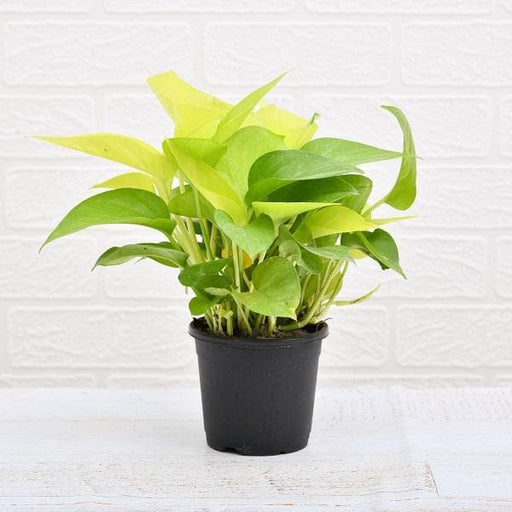 Save 29%
Save 29%
Air Purifier Money Plant with Pot The Air Purifier Money Plant, also known as Pothos or Epipremnum aureum, is a stunning indoor plant that...
View full details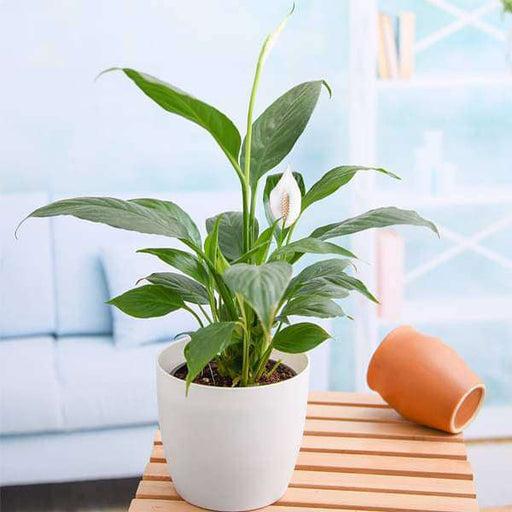
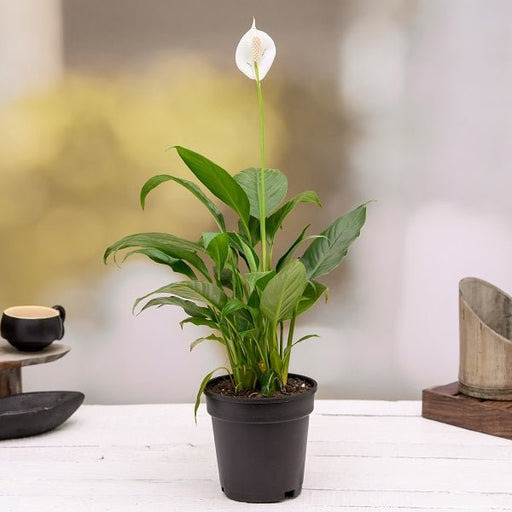 Save up to 15%
Save up to 15%
Peace Lily, Spathiphyllum - Plant The Peace Lily, scientifically known as Spathiphyllum, is a stunning houseplant celebrated for its elegant white...
View full details
 Save 25%
Save 25%
Jasminum sambac, Mogra, Arabian Jasmine - Plant Jasminum sambac, commonly known as Mogra or Arabian Jasmine, is a fragrant flowering plant...
View full details
 Save 18%
Save 18%
Combo Constituents Includes the Parijat Tree (Night-Flowering Jasmine), a culturally significant plant with fragrant flowers. Description The Pari...
View full details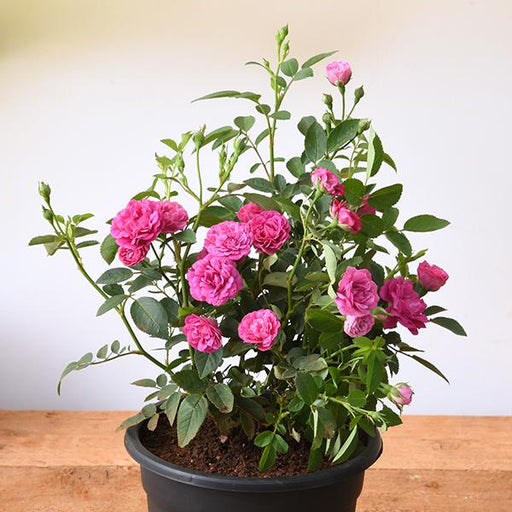
 Save 25%
Save 25%
Miniature Rose, Button Rose (Any Color) - Plant The Miniature Rose, also known as the Button Rose, is a charming and compact flowering plant that ...
View full details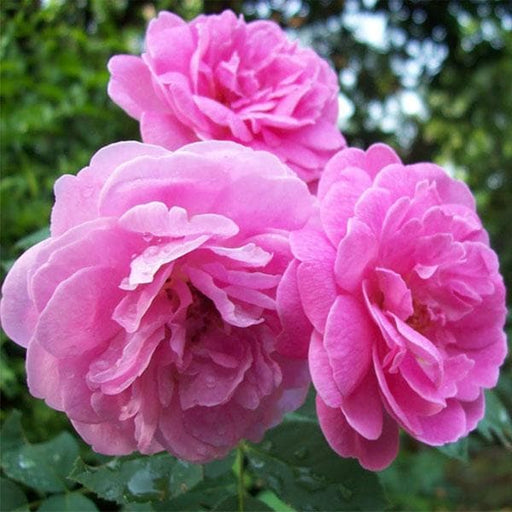 Save 25%
Save 25%
Damascus Rose, Scented Rose (Any Color) - Plant The Damascus Rose, also known as Rosa damascena, is a timeless symbol of beauty and romanc...
View full details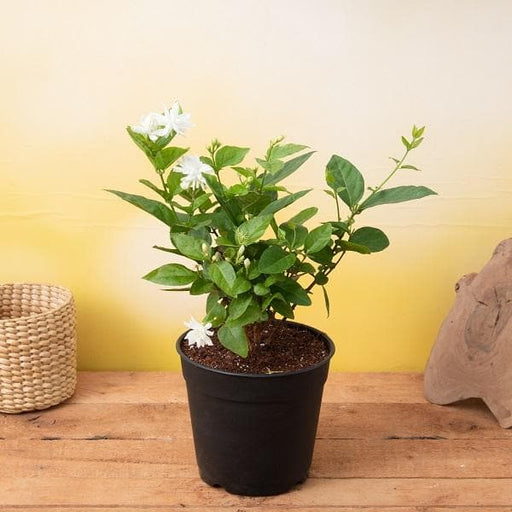
 Save 17%
Save 17%
Beautiful Fragrant Mogra, Arabian Jasmine Plant with Pot The Beautiful Fragrant Mogra, also known as Arabian Jasmine (Jasminum sambac), is...
View full details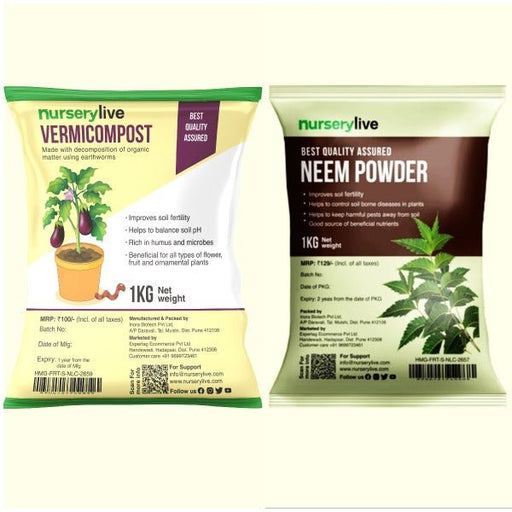 Save 15%
Save 15%
Pack of Vermicompost and Neem Cake for House Plants Transform your indoor garden with our premium Pack of Vermicompost and Neem Cake, spec...
View full details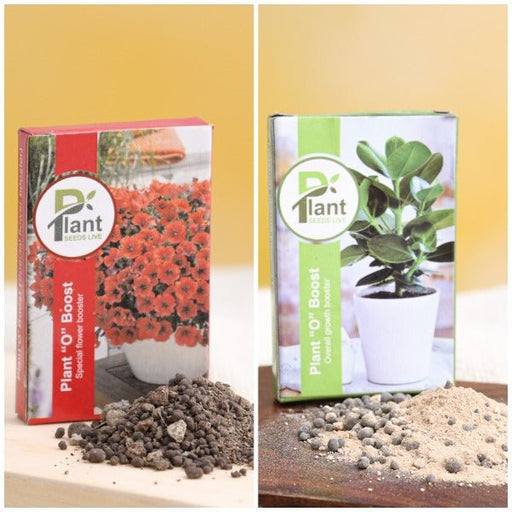
Pack of Plant Growth and Flower Boosters Unlock the full potential of your garden with our Pack of Plant Growth and Flower Boosters! This ...
View full details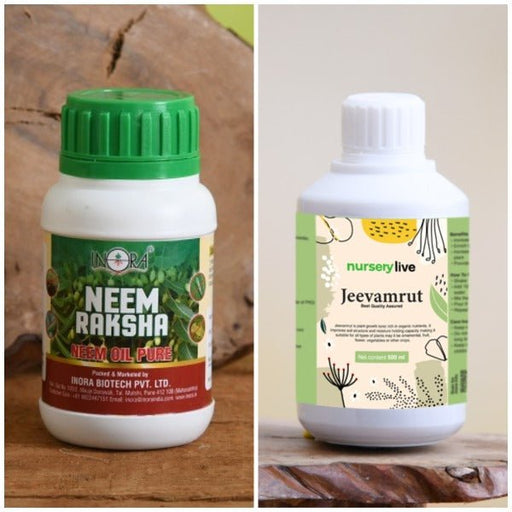 Save 38%
Save 38%
Combo of Jeevamrut and Neem Raksha for Easy Growth and Protection of Houseplants Transform your indoor garden with our exclusive combo of ...
View full details Save 22%
Save 22%
Plant Nutrients Kit (Pack of 16) for a Healthy Garden Transform your garden into a lush paradise with our Plant Nutrients Kit, featuring 1...
View full details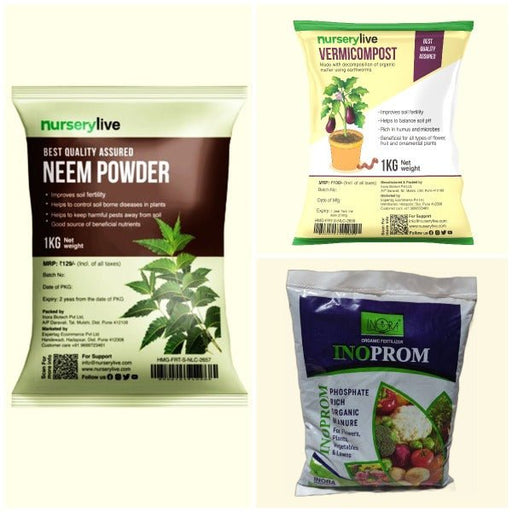 Save 16%
Save 16%
Combo of Top Plant Fertilizers Elevate your gardening game with our exclusive Combo of Top Plant Fertilizers, featuring two bags of premiu...
View full details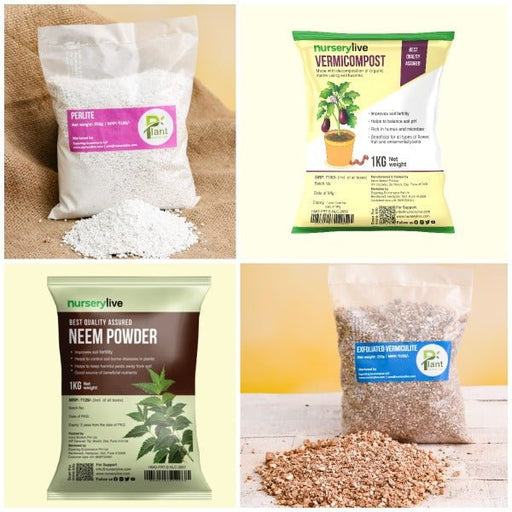 Save 24%
Save 24%
Pack of 4 Additives to Make Soil Healthy and Nutrient Rich Transform your garden into a thriving ecosystem with our Pack of 4 Additives de...
View full details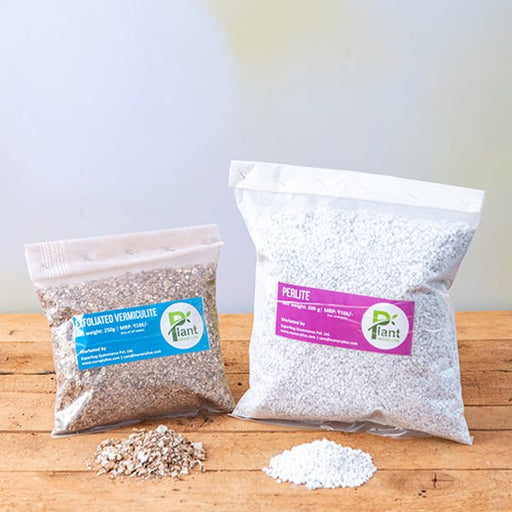 Save 30%
Save 30%
Transform your gardening experience with our premium Combo of Perlite and Vermiculite. This unique blend is designed to enhance soil aeration and ...
View full details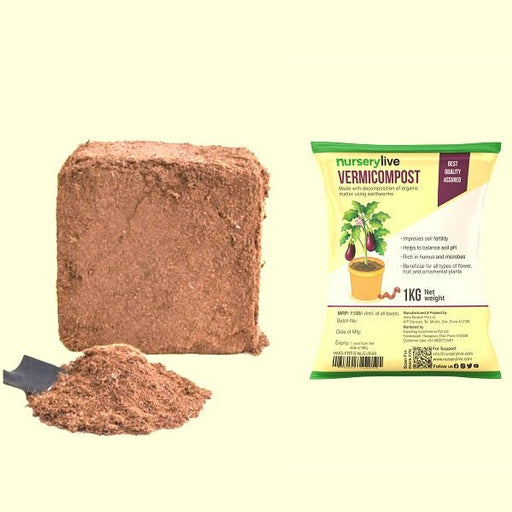 Save 27%
Save 27%
Combo of 2 Vermicompost and Cocopeat - Enrich Your Soil Naturally! Transform your garden into a thriving ecosystem with our Combo of 2 Ver...
View full details
 Save 35%
Save 35%
Best 6 Plants for Perfect Indoor Garden Transform your living space into a lush oasis with our curated collection of the Best 6 Plants for a...
View full details
 Save up to 50%
Save up to 50%
Mini Succulent Garden Pack Transform your space with our Mini Succulent Garden Pack, featuring a delightful collection of 4 any variety beautiful s...
View full details
 Save 30%
Save 30%
5 Best Fragrant Plants Transform your garden or indoor space into a fragrant paradise with our curated selection of the 5 Best Fragrant Plants. Th...
View full details
 Save 24%
Save 24%
Set of 2 Bonsai Looking Grafted Adeniums Transform your indoor or outdoor space with our exquisite Set of 2 Bonsai Looking Grafted Adenium...
View full details Save 45%
Save 45%
Top 4 Die Hard Succulents Pack Transform your indoor or outdoor space with our Top 4 Die Hard Succulents Pack, featuring a curated selecti...
View full details
 Save 30%
Save 30%
5 Best Indoor Plants Pack Transform your living space into a lush oasis with our '5 Best Indoor Plants Pack.' This carefully curated collection fe...
View full details
 Save 25%
Save 25%
Set of 4 Evergreen Air Purifier Plant Pack Transform your indoor space into a lush, green oasis with our Set of 4 Evergreen Air Purifier Pla...
View full details| SrNo | Item Name |
|---|---|
| 1 | Punica granatum ganesh - Plant |
The Punica granatum Ganesh, commonly known as the Ganesh Pomegranate, is a stunning fruit-bearing plant renowned for its vibrant flowers and delicious, nutrient-rich fruits. This cultivar is celebrated for its ornamental beauty and exceptional taste, making it a favorite among gardeners and culinary enthusiasts alike. With its origins tracing back to the Mediterranean region, the Ganesh Pomegranate thrives in various climates, offering both aesthetic appeal and health benefits.
What makes the Ganesh Pomegranate special is its unique combination of ornamental and edible qualities. The plant produces striking red flowers that attract pollinators, followed by large, juicy fruits that are packed with antioxidants, vitamins, and minerals. This variety is particularly noted for its sweet flavor and vibrant color, making it a delightful addition to any garden or landscape.
One of the special features of the Punica granatum Ganesh is its adaptability to different soil types and climates. It can thrive in both arid and temperate regions, making it an excellent choice for sustainable gardening. Additionally, the plant's deep root system helps prevent soil erosion, contributing positively to the environment.
If you think the Punica granatum, or pomegranate tree, is just a pretty face, think again! This botanical wonder is packed with antioxidants, vitamins, and minerals that can make your health sing. From boosting your immune system to improving heart health, this tree is like a personal trainer for your insides. Plus, who wouldn’t want to impress their friends with a fruit that sounds like it belongs in a Harry Potter spell?
When you think of Ganesh, the elephant-headed deity, you might not immediately picture a pomegranate. But this fruit symbolizes abundance and fertility in many cultures, making it a perfect companion for the remover of obstacles. So, plant your Punica granatum with a prayer to Ganesh, and watch as your garden flourishes like a Bollywood blockbuster!
Caring for your Punica granatum is like raising a child—except this one doesn’t throw tantrums. With the right amount of sunlight, water, and love, your pomegranate tree will reward you with luscious fruits. Just remember, it’s not a cactus; it needs a little TLC, but not too much. Overwatering is a crime in the plant world!
Planting a Punica granatum is like setting the stage for a grand performance. Choose a sunny spot, dig a hole that’s as deep as your dreams, and give it some space to grow. Don’t forget to add compost; it’s like giving your tree a five-star meal before the big show.
The pomegranate fruit is the diva of the fruit world. From salads to juices, it can jazz up any dish. Want to impress at a dinner party? Sprinkle some pomegranate seeds on your dessert and watch your guests swoon. It’s like the cherry on top, but with a lot more pizzazz!
Not all pomegranate trees are created equal. Some are sweet, some are tart, and some are just plain show-offs. Whether you prefer the classic red or the exotic pink, there’s a variety for every taste bud. It’s like a fruit buffet right in your backyard!
If you’re looking for a superfood that doesn’t wear a cape, look no further than the pomegranate. Packed with vitamins C and K, this fruit can help lower blood pressure and improve cholesterol levels. It’s like a health coach in a shiny red package, ready to whip your body into shape!
The growth rate of your Punica granatum can be as thrilling as a rollercoaster ride. With the right conditions, you can expect it to grow up to 12 feet tall in just a few years. Talk about a fast track to a fruit-filled paradise! Just remember, patience is key; good things come to those who wait.
Every garden has its villains, and the pomegranate tree is no exception. From pesky aphids to sneaky fruit flies, these pests can turn your garden into a battlefield. But fear not! With a little vigilance and some organic pest control, you can keep your tree safe and sound. It’s like being a superhero for your plants!
Pruning your Punica granatum is like giving it a stylish haircut. It helps promote healthy growth and ensures that your tree doesn’t look like it just rolled out of bed. Snip away the dead branches and shape it up; your tree will thank you with a bounty of fruit!
Want to multiply your pomegranate tree like rabbits? Propagation is the way to go! You can grow new trees from seeds or cuttings, making it a fun project for the whole family. Just remember, patience is a virtue; good things take time, especially when it comes to growing your own fruit!
Punica granatum ganesh, also known as the Ganesh Pomegranate, is a delightful fruit-bearing shrub that brings a splash of color and flavor to your garden. With its vibrant flowers and juicy fruits, it’s like having a mini fruit fiesta right at home. Plus, who wouldn’t want a plant named after the beloved elephant-headed deity
Caring for your Ganesh Pomegranate is as easy as pie—pomegranate pie, that is! Ensure it gets plenty of sunlight, water it moderately, and give it well-draining soil. Prune it occasionally to keep it looking sharp. With a little love, it’ll reward you with luscious fruits that’ll make your taste buds dance!
Growing a Ganesh Pomegranate is like having a health guru in your garden! Packed with antioxidants, vitamins, and minerals, its fruits can boost your immune system and improve heart health. Plus, the plant itself is a stunning addition to your landscape, making your neighbors green with envy. Who knew health could look so good
Absolutely! If you have a sunny spot, your Ganesh Pomegranate can thrive indoors. Just make sure it gets at least six hours of sunlight daily. With a little TLC, you can enjoy its beautiful blooms and tasty fruits right from your living room. Who needs a tropical vacation when you have this beauty at home
Get ready for a floral extravaganza! The Ganesh Pomegranate typically blooms in late spring to early summer, showcasing stunning red-orange flowers that are sure to steal the show. These beauties not only attract pollinators but also set the stage for the delicious fruits to come. It’s like nature’s own fireworks display!
Patience is a virtue, especially with the Ganesh Pomegranate! Generally, it takes about 2 to 3 years for your plant to start bearing fruit. But once it does, you’ll be rewarded with a bountiful harvest of juicy pomegranates that’ll make the wait worthwhile. Good things come to those who garden!
Keep an eye out for pesky pests like aphids and spider mites that might try to crash your Ganesh Pomegranate party. Regularly inspect your plant and use organic insecticides if needed. Remember, a healthy plant is a happy plant, and you want it to shine like the star it is!
Yes, indeed! The Ganesh Pomegranate is a bit of a water-saving superstar. Once established, it can tolerate short periods of drought, making it perfect for those who forget to water occasionally. Just don’t let it go too dry—after all, even the best plants need a drink now and then!
You bet! Propagating your Ganesh Pomegranate is as easy as pie—pomegranate pie, of course! You can do it through seeds or cuttings. Just ensure you provide the right conditions, and soon you’ll have a mini orchard of these delightful plants. Sharing is caring, especially when it comes to delicious fruits!
Your Ganesh Pomegranate prefers well-draining soil that’s rich in organic matter. Think of it as a fancy spa treatment for your plant! A slightly acidic to neutral pH is ideal. This way, your plant can soak up all the nutrients it needs to thrive and produce those scrumptious fruits you crave.
The Ganesh Pomegranate is a tough cookie! It can survive mild winters, but if you live in a colder climate, consider bringing it indoors or providing some protection. A little extra care during chilly months will ensure your plant comes back stronger and ready to produce those fabulous fruits come spring!